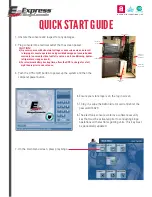
26
PROBLEM
CAUSE
REMEDY
(1) Belt
1. Belt is not
properly aligned.
(1) Rollers, pulleys, etc. are set at incorrect
angles.
(2) Materials are not in belt center.
(3) Materials have stuck to rollers, pulleys,
etc.
(4) Belt has expanded and become loose.
(5) Belt form is incorrect. (Failure in endless
belt processing)
(6) Frame is not straight.
(7) Frame is not level on top. (Belt tends to
deviate to lower side.)
(8) Belt has excessive resistance to
winding. (Inappropriate belt has been
chosen.)
(1) Adjust attachment angles of rollers, pulleys,
etc.
(2) Put materials in belt center, distributing them
equally.
(3) Clean and remove any foreign matter.
(4) Take up belt slack.
→
see p.19
(5) Redo endless belt processing, or replace belt.
(6) Correct frame condition.
(7) Correct frame condition.
(8) a. Keep belt running without load until it fits
machine.
b. Replace with appropriate one.
2. Belt
undersurface has
become worn
unusually.
(1) Belt slips on motor pulley (or drive
pulley).
(2) There are materials or foreign
substances between belt and pulleys.
(Foreign substances have stuck to
pulleys.)
(3) Rotation malfunction of rollers, pulleys,
etc.
(1) Take up belt slack.
→
see p.19
(2) a. Remove any foreign matter.
b. Properly put materials on belt so that they
will not get inside machine.
(3) Replace defective rollers, pulleys, etc.
3. Belt has been
damaged.
(Belt tears
vertically.)
(1) Materials or foreign substances have
stuck to hopper, scraper, etc.
(2) Rollers, pulleys, etc. have come off and
brackets are touching belt.
(3) Rollers with rotation malfunction have
holes on surfaces after wearing out.
(4) Shock by heavy materials falling onto
conveyor
(5) Materials have projections.
(1) Remove any foreign matter.
(2) Correctly reinstall rollers, pulleys, etc. into
brackets.
(3) Replace defective rollers.
(4) Properly put materials on belt considering
their weight so that they will not damage belt.
(5) Do not carry materials with projections by
conveyor.
4. Belt has
expanded
unusually.
(1) Belt has been taken up too much.
(2) Expansion by materials of high
temperature
(3) Expansion by overload
(4) Belt has expired.
(1) Loosen belt to proper tension.
(2) Replace for heat-resistant belt.
(3) Reduce load.
(4) Replace belt.
→
see p.23
5. Belt has
warped.
(1) Materials contain oil (if belt has warped
to lower cover side).
(2) Warp by materials of high temperature
(3) Materials contain acid or alkali.
(1) Remove cause of oil, or replace with oil-
resistant belt.
(2) Replace with heat-resistant belt.
(3) Replace with acid-resistant or alkali-resistant
belt.
10-1. PROBLEMS AND REMEDIES
To use conveyor performance fully and make its service life longer, it is necessary to carry out inspection
and maintenance properly. For electrical matter, inspection and maintenance should be carried out by
appropriate qualified specialists.
10
INSPECTION AND MAINTENANCE
Summary of Contents for S-CON BABY SBF
Page 1: ...1 S CON BABY SBF and SBT models BFS and BTS models OPERATING AND SERVICE MANUAL...
Page 30: ...30 MEMO...
Page 31: ...31 MEMO...







































